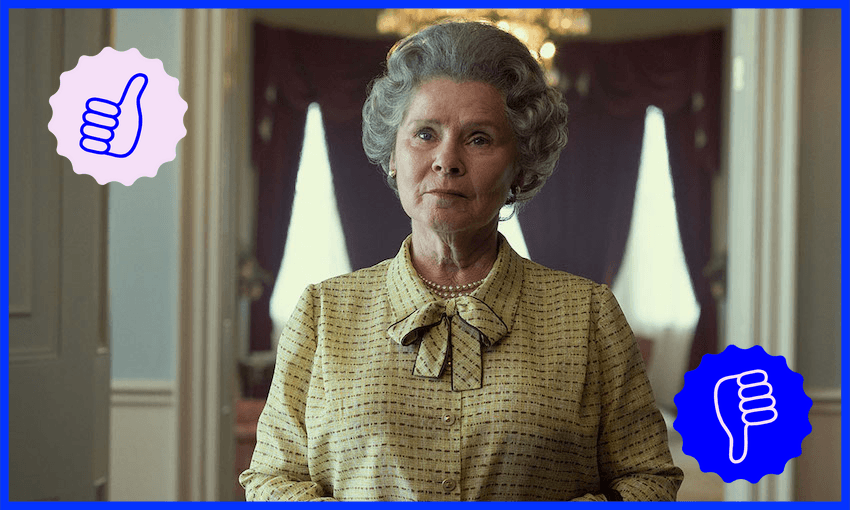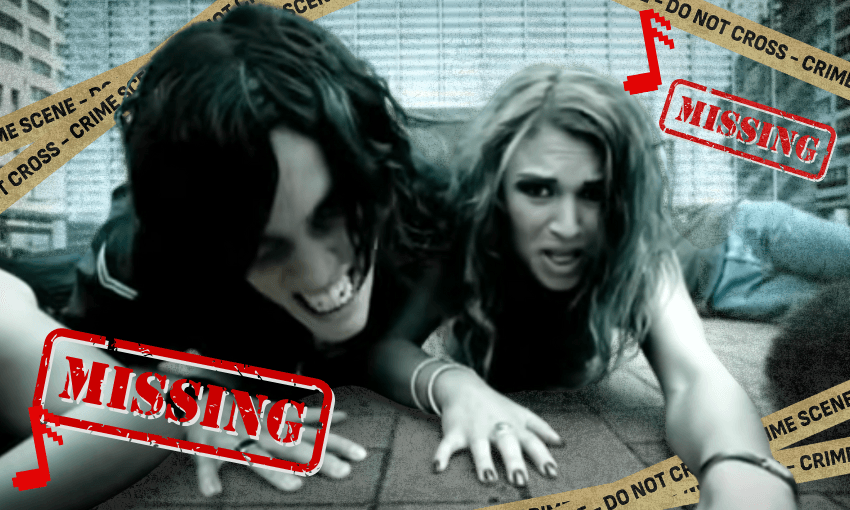The first season of Netflix’s prestige drama since the death of Queen Elizabeth II is its most controversial one yet, writes Sam Brooks.
The lowdown
Well, It’s The Crown. It’s one of Netflix’s most successful shows, the crown (sorry) jewel of the streaming service since its first season six years ago. Now a third cast is taking on aged-up roles: Imelda Staunton as Queen Elizabeth II, Jonathan Pryce as Prince Philip, Lesley Manville as Princess Margaret, Dominic West as Prince Charles and, most thrillingly, Elizabeth Debicki as Princess Diana.
Seasons of The Crown vary only so much. If you were into what the series was doing way back in when QEII was crowned, chances are you’ll be equally engrossed now. If you weren’t interested then, you’re not going to suddenly jump in at this point, even out of a sense of morbid curiosity about its portrayal of Diana around the time of her divorce.
The good
It’s business as usual at Buckingham Palace. Each hour-long episode still looks like it cost as much as a feature film. Creator Peter Morgan again structures each episode around a historical event, and uses it to comment on the monarchy and those who orbit it. This season covers most of the 90s, splitting its focus between the Princess Diana drama (including the infamous Martin Bashir interview, obviously) and Queen Elizabeth being forced to confront her declining popular relevance.
As expected by this point, everybody on screen is excellent. Imelda Staunton’s Elizabeth is much more muted than Claire Foy and Olivia Colman’s take on the monarch, perhaps reflecting the Queen’s gradual retreat from the limelight. Elizabeth Debicki’s Diana is a more complex creation than Emma Corrin’s; she marries vulnerability with small moments of defiance, showing us the steel and savvy we now know she had. As Charles, Dominic West is a good deal more charming than Josh O’Connor, while Jonathan Pryce ably captures Prince Philip, well on his way to being the increasingly doddering public figure he was in his later years. And Lesley Manville as Princess Margaret? Luminous, as always. (Whoever plays Margaret does tend to have the most fun.)
Perhaps the most impressive moments of this season are when Morgan decides to swerve. An episode dedicated to Queen Elizabeth’s “annus horribilis” speech barely spends any time on the monarch herself, instead focusing on how her family’s personal sacrifices in support of the monarchy have chipped away at their own humanity. It’s an episode that shows what The Crown can be at its best: not an alternative narrative, but an alternative lens on a narrative we already know so well.
The Crown is wrapped up in so much prestige that it’s easy to forget that it can be quite audacious, despite its stuffy trappings. One episode focuses entirely on Mohamed Al-Fayed, the father of Diana’s future lover, poking sly fun at the sort of social climbers who try to ingratiate themselves with the royal family. Another episode, ‘Ipatiev House’, loosely focused on Queen Elizabeth’s interactions with Boris Yeltsin and Prince Philip’s companion Penny Knatchbull (Natasha McElhone, brilliant and earthy), has an opening so shockingly brutal that I thought I had turned on another show.
The not-so-good
While the question of whether The Crown is “fictional” gets most of the headlines (it’s got actors in it – it’s fiction, duh), I find the tension between critique and lionisation in the series much more interesting. For all the criticism the show has received for distorting the image of the royal family, Morgan has never quite landed a blow on the actual institution, preferring instead to extend to its members an empathy that often borders on sympathy. A writer empathising with his subjects makes for good drama, but there’s a sense that he, like millions of people around the world, has been a little bit hoodwinked by his royal subjects.
There’s always a sense that his familiarity with these characters, and his willingness to explore their inner lives and struggles, prevents him from identifying their complicity with a system they benefit from and continue to perpetrate. The edges of even the sharpest, most unlikeable characters have been sanded down here; Prince Philip is now more of a benevolent grandfather than the curmudgeonly relic he’d been portrayed as just one season ago. Meanwhile, Martin Bashir is depicted, fairly or otherwise, as a moustache-twirling villain.
As The Crown marches closer into the present day, Morgan’s approach gets harder to accept. It’s hard to depict Prince Charles’ cringeworthy phone calls with Camilla with anything but derision, but he manages to do so, largely by turning Charles into a symbol for stoicism in the face of humiliation. While Morgan’s never been shy of turning these characters into symbols and metaphors, it feels like he’s doing so here to hide the fact that they’re getting increasingly more difficult to empathise with.
Symbols are pretty, and they mean something, but they’re not as deep as people are. A fire at Windsor Castle during a public low point for the royal family is an obvious metaphor; it doesn’t require as much deep thought as it gets here. Symbols are also an easy way to make a sweeping statement, giving the appearance of investigation without actually doing any digging. Whether Morgan is incapable of or unwilling to interrogate what those symbols stand in for is becoming depressingly clear.
The verdict
The Crown is never anything less than good, and when it’s at its best, it’s some of the best TV around. It has thrived on giving us a different spin on events that we only know from history books, and doing so with exceptional actors and outstanding production values. However, as it creeps closer to the present day it becomes increasingly clear that this is not a definitive take on the royal family, but one man’s commentary on it.
Early in the first episode of the season there’s a comedy of errors as the Queen’s staff tries to keep a newspaper criticising her out of her sight. The papers called her “irrelevant, old, expensive, out of touch”. Despite being beautifully made, well-acted and occasionally remarkably insightful, the same critiques could be fairly made of The Crown.



